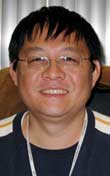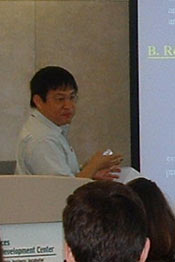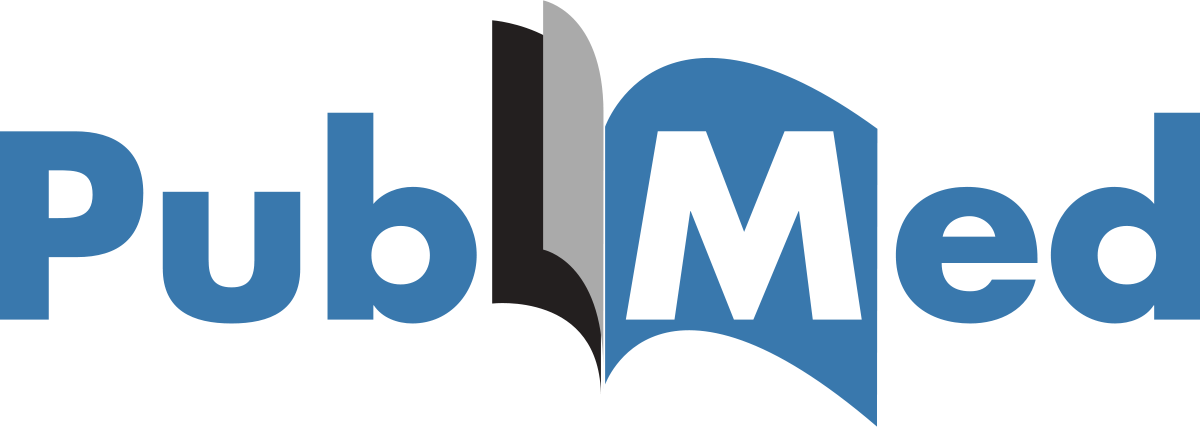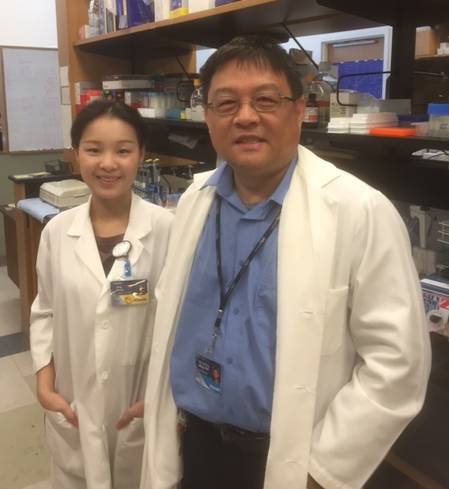- Augusta University
- Colleges & Schools
- Medical College of Georgia
- Physiology
- Faculty | Physiology
- Mong-Heng Wang, PhD
Mong-Heng Wang, PhD
Associate Professor

Phone: (706) 721-3830
Fax: (706) 721-7299
Email: mwang@augusta.edu
Office: CA-3092
Lab: CA-3097
Learn more about Dr. Wang's Research
Education and Training
New York Medical College: Valhalla, NY
Post Doctoral Training - Pharmacology 1995-1998.
Rutgers University: Piscataway, New Jersey
PhD - Biochemistry, 1990-1995.
National Taiwan University: Taipei, Taiwan
BS - Chemistry, 1982-1986.
Academic Appointments
2007-present - Associate Professor, Department of Physiology, Medical College of Georgia, Augusta, Georgia.
2002-2007 - Assistant Professor, Department of Physiology, Medical College of Georgia, Augusta, Georgia.
2002 - Assistant Professor, Department of Pharmacology, New York Medical College, Valhalla, New York.
2001-2002 - Research Assistant Professor, Department of Pharmacology, New York Medical College, Valhalla, New York.
1998-2001 - Instructor, Department of Pharmacology, New York Medical College, Valhalla, New York.

RESEARCH INTERESTS
I have worked in the field of cytochrome P450 (CYP)-derived eicosanoids in cardiovascular diseases, renal diseases, and diabetes for more than 20 years. Throughout these years we have identified new compounds and pathways and elucidated their biological activities and their therapeutically potential for treatment of cardiovascular and diabetes-associated disorders. These findings put us in the forefront and gave us national recognition for our contribution to the characterization of biologically active compounds for their functional implication in health and disease. Since joining the Department of Physiology as Assistant Professor started in December 2002, I have been very active in research. I have authorship in 53 scholastic publications since 2003. Some of these articles are published in high impact journals including, Circulation, Hypertension, Diabetes, JASN, FASEB Journal, and Kidney International. Moreover, my recent discovery shows that the 20-HETE blocker eliminates stroke side effects and increases anti-tumor efficacy of Coxibs (COX-2 selective inhibitors). This discovery was awarded by a patent through the office of Innovation Commercialization at Augusta University.
Current Projects
- “Interaction of sEH and Angiotensin II in Retinopathy”
- “Interaction of COX-2 and 20-HETE in Ischemic Stroke"
Awards and HONORS
| 2018 | Medical College of Georgia Exemplary Teaching Award |
| 2017 | Medical College of Georgia Exemplary Teaching Award |
| 2008 | Best Abstract award (Senior author). The 10th Annual Winter Eicosanoid Conference |
| 2006 | Best Abstract award (Senior author). The 8th Annual Winter Eicosanoid Conference |
| 2005 | Young Faculty Travel Award (The 7th Annual Winter Eicosanoid Conference) |
| 2002 | Aventis New Investigator Award (The 56th Annual Conference of the Council for High Blood Pressure Research) |
| 2000 | Merck New Investigator Award (The 54th Annual Conference of the Council for High Blood Pressure Research) |
| 1999-2002 | American Heart Association New York Affiliate Scientist Development Award |
| 1998 | Young Investigator Award (The Eastern Hypertension Society) |
| 1997-1999 | American Heart Association New York Affiliate Postdoc Fellowship |
Representative Publications
|
F. Huang; Y. Liu, X. Yang, D. Chen, K. Qiu, B. D. Hammock, J. Wang, M.H. Wang, J. Chen, H. Huang. ShexiangBaoxin pills promote angiogenesis in myocardial infarction
rats via up-regulating 20-HETE-mediated endothelial progenitor cells mobilization.
Atherosclerosis, in press, 2017 |
|
A. Ibrahim, H. Saleh, M. El-Shafaey, K. Hussein, K. El-Masry, B. Baban, N. Sheibani, M. H. Wang, A. Twafik, M. Al-Shabrawey. Targeting of 12/15-Lipoxygenase in retinal endothelial cells, but not in monocytes/macrophages, attenuates high glucose-induced retinal leukostasis. Biochim. Biophys. Acta, in press, 2017. |
|
W. Feng, K. Zhang, Y. Liu, J. Chen, Q. Cai, Y. Zhang, M.H. Wang, J. Wang, H. Huang. Apocynin attenuates angiotensin II-induced vascular smooth muscle cells osteogenic switching via suppressing extracellular signal-regulated kinase 1/2. Oncotarget, 7, 83588-83600, 2016. |
|
J. Gao, K. Zhang, J. Chen, M.H. Wang, J. Wang, P. Liu, H. Huang. Roles of aldosterone in vascular calcification: an update. Eur. J. Pharmacol., 786,186-93, 2016. |
|
H. Huang, J. Weng, M.H. Wang. EETs/sEH in diabetes and obesity-induced cardiovascular diseases. Prostaglandins & Other Lipid Mediators, 125, 80-89, 2016. |
|
H. Huang, M. Al-Shabrawey, M. H. Wang. Cyclooxygenase- and cytochrome P450-derived eicosanoids in stroke. Prostaglandins & Other Lipid Mediators, 122, 45–53, 2016. |
|
Y. Zhang, M. N. Hoda, X. Zheng, W. Li, P. Luo, K. R. Maddipati, T. Seki, A. Ergul, M. H. Wang. Combined therapy with COX-2 inhibitor and 20-HETE inhibitor reduces colon tumor growth and the adverse effects of ischemic stroke associated with COX-2 inhibition. Am. J. Physiol., 307, R693-R703, 2014. |
|
L. Wang, Y. Liu, H. Wang, X. Liu, J. Chen, M.H. Wang, J. Wang, H. Huang. Epoxyeicosatrienoic acids attenuating hypotonic-induced apoptosis of IMCD cells via -ENaC inhibition, PLoS One, 9, e94400, 2014. |
|
H. Zhang, T. Wang, K. Zhang, Y. Liu, F. Huang, X. Zhu, Y. Liu, M. H. Wang, W. Tang, J. Wang, H. Huang, Deletion of soluble epoxide hydrolase attenuates cardiac hypertrophy via down-regulation of cardiac fibroblasts-derived fibroblast growth factor-2, Critical Care Medicine, 42, e345-354, 2014. |

